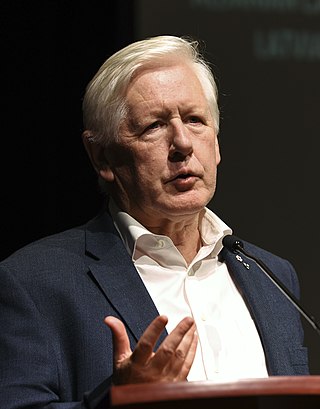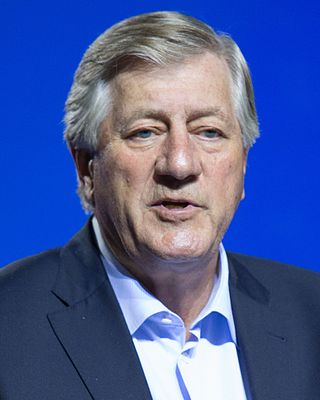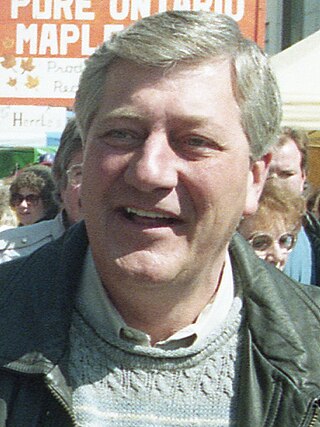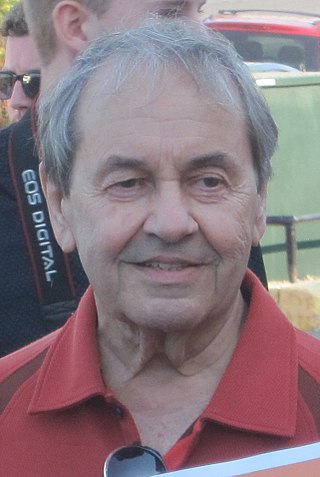
Robert Keith Rae is a Canadian diplomat and former politician who is the current Canadian Ambassador to the United Nations since 2020. He previously served as the 21st premier of Ontario from 1990 to 1995, leader of the Ontario New Democratic Party from 1982 to 1996, and interim leader of the Liberal Party of Canada from 2011 to 2013. Between 1978 and 2013, he was elected 11 times to federal and provincial parliaments.

Michael Deane Harris is a retired Canadian politician who served as the 22nd premier of Ontario from 1995 to 2002 and leader of the Progressive Conservative Party of Ontario from 1990 to 2002. During his time as party leader, he guided the Ontario PC Party toward Blue Toryism, advocating for the "Common Sense Revolution", his government's program of deficit reduction in combination with lower taxes and budget cuts.

David Robert Peterson is a Canadian lawyer and former politician who served as the 20th premier of Ontario from 1985 to 1990. He was the first Liberal officeholder in 42 years, ending the so-called Tory dynasty.

Dalton James Patrick McGuinty Jr. is a former Canadian politician who served as the 24th premier of Ontario from 2003 to 2013. He was the first Liberal leader to win two majority governments since Mitchell Hepburn nearly 70 years earlier. In 2011, he became the first Liberal premier to secure a third consecutive term since Oliver Mowat after his party was re-elected in that year's provincial election.
The phrase Common Sense Revolution (CSR) has been used as a political slogan to describe conservative platforms with a main goal of reducing taxes while balancing the budget by reducing the size and role of government. It has been used in places such as Australia and Canada. This article deals with the "Common Sense Revolution" as it was under Ontario Premier Mike Harris and the Progressive Conservative Party of Ontario from 1995 to 2002.

The Ontario New Democratic Party is a social-democratic political party in Ontario, Canada. The party currently forms the Official Opposition in Ontario following the 2018 general election. It is a provincial section of the federal New Democratic Party. It was formed in October 1961 from the Co-operative Commonwealth Federation and the Ontario Federation of Labour (OFL).

The Canadian Labour Congress, or CLC is a national trade union centre, the central labour body in Canada to which most Canadian labour unions are affiliated.

The 1995 Ontario general election was held on June 8, 1995, to elect members of the 36th Legislative Assembly of the province of Ontario, Canada. The writs for the election were dropped on April 28, 1995.
Floyd Laughren is a former politician in Ontario, Canada. He was a New Democratic member of the Legislative Assembly of Ontario from 1971 to 1998 who represented the northern Ontario riding of Nickel Belt. He served in cabinet as Finance Minister and Deputy Premier in the government of Bob Rae.
Michael James Breaugh was a Canadian politician. He served in the Legislative Assembly of Ontario from 1975 to 1990, and in the House of Commons of Canada from a 1990 by-election until 1993.
Frances Lankin,, is a Canadian senator, former president and CEO of United Way Toronto, and a former Ontario MPP and cabinet minister in the NDP government of Bob Rae between 1990 and 1995. From 2010 to 2012, she co-chaired a government commission review of social assistance in Ontario. From 2009 to 2016, she was a member of the Security Intelligence Review Committee.
Basil Eldon "Buzz" Hargrove is a Canadian labour leader and the former National President of the Canadian Auto Workers. He is currently serving as a Distinguished Visiting Professor at Toronto Metropolitan University's Ted Rogers School of Management.

John R. Rodriguez was a Canadian politician. He served as the mayor of Greater Sudbury, Ontario from 2006 to 2010 and previously represented the electoral district of Nickel Belt in the House of Commons of Canada from 1972 to 1980 and from 1984 to 1993 as a member of the New Democratic Party.

The Province of Ontario is governed by a unicameral legislature, the Parliament of Ontario, composed of the Lieutenant Governor and the Legislative Assembly, which operates in the Westminster system of government. The political party that wins the largest number of seats in the legislature normally forms the government, and the party's leader becomes premier of the province, i.e., the head of the government.
Robert Warren (Bob) Mackenzie was a politician in Ontario, Canada. He was a New Democratic Party member of the Legislative Assembly of Ontario from 1975 to 1995, and a prominent cabinet minister in the government of Bob Rae.
Karen Haslam is a former politician in Ontario, Canada. She was a New Democratic Party member of the Legislative Assembly of Ontario from 1990 to 1995 and served as a minister in the government of Bob Rae. From 2000 to 2003, she served as mayor of Stratford, Ontario.
Mark Morrow is a politician in Ontario, Canada. He was a New Democratic Party member of the Legislative Assembly of Ontario from 1990 to 1995.
The governing New Democratic Party of Ontario ran a full slate of candidates in the 1995 Ontario provincial election, and fell to third place status with 17 of 130 seats. Many of the party's candidates have their own biography pages; information on others may be found here.
The Ontario government debt consists of the liabilities of the Government of Ontario. Approximately 82% of Ontario's debt is in the form of debt securities, while other liabilities include government employee pension plan obligations, loans, and accounts payable. The Ontario Financing Authority, which manages the provinces' debt, says that as of March 31, 2020, the Ontario government's net debt is CDN $353.3 billion. Net debt is projected to rise to $398 billion in 2020-21. The Debt-to-GDP ratio for 2019-2020 was 39.7%, and is projected to rise to 47.1% in 2020-21. Interest on the debt in 2019-20 was CDN$12.5 billion, representing 8.0% of Ontario's revenue and its fourth-largest spending area.
The 1996 Ontario New Democratic Party leadership election was held in Hamilton, Ontario, on June 22, 1996 to elect a successor to Bob Rae as leader of the Ontario New Democratic Party (NDP). The convention was necessary because Rae resigned on February 29, 1996. Frances Lankin was an early favourite but was hurt due to her close association with the Rae government. Hampton, an outsider, led on the first ballot and won the leadership by 178 votes over Lankin on the third ballot. He remained as leader of the party until 2009.








